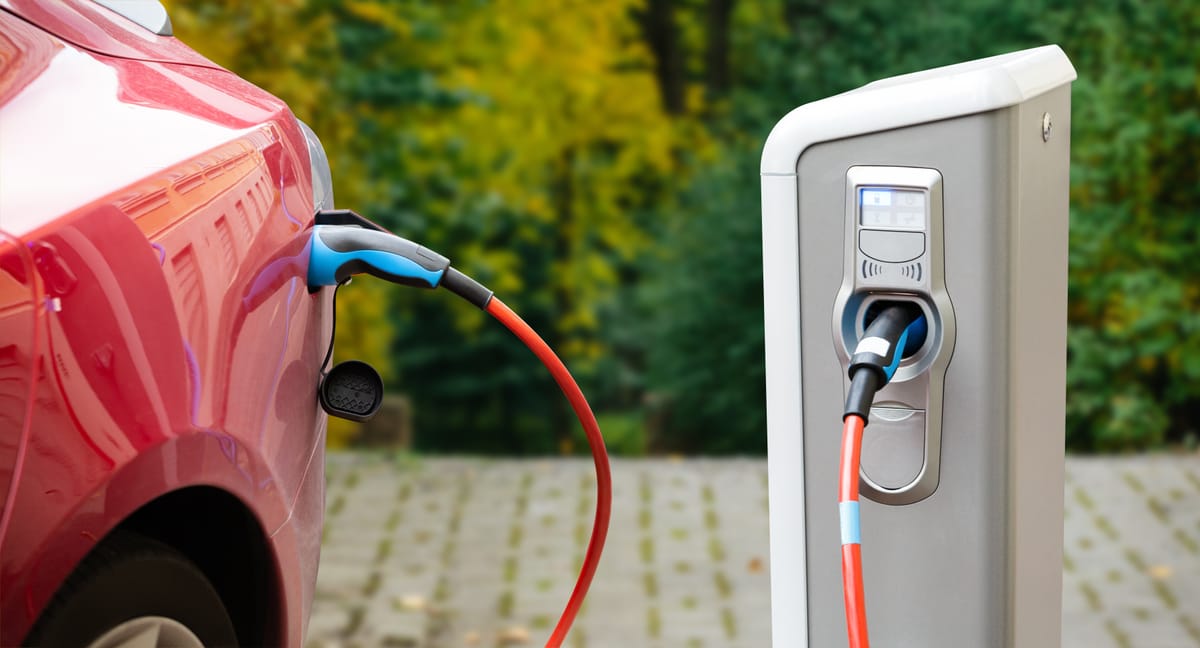This week, we're looking at the surge of EV charging stations in California, plummeting costs of renewable energy in Europe, and a new solar company in space.
If you enjoy our Weekly Brief, please consider sharing it with your friends and colleagues in the climate community and encourage them to subscribe here. You can also follow Tectonic on LinkedIn and Instagram for more regular updates.
More charging stations in California than gas pumps: California has approximately 178,000 shared EV chargers, surpassing the 120,000 gas pumps in the state. This doesn't include the 700,000 private chargers installed in single-family homes. The number of EV chargers has nearly doubled since 2023, with more expected to be added to support the growing number of electric vehicles. California is estimated to need around 1 million shared EV chargers by 2030, and over 2 million by 2025 to support the projected 7 million light-duty electric vehicles on the road.
UK produces record amount of solar: The United Kingdom generated a record amount of solar power on a Tuesday afternoon, with solar panels producing as much as 12.2 gigawatts of power, according to the National Energy System Operator. This record is likely to be broken later in the year, as peak solar production typically occurs in the middle of summer, and the UK continues to add new solar capacity to its existing fleet of panels. The surge in solar power production in Europe, including the UK, is contributing to a significant decrease in wholesale electricity prices, with the UK seeing prices fall to as low as negative £1.80 ($2.33) per megawatt hour.
France power prices plunge below zero: The power price in France has plummeted to as low as minus €413 a megawatt-hour due to an overwhelming amount of solar generation flooding the grid. Negative power prices are becoming more frequent across Europe as renewable power, especially solar, continues to grow and overwhelm the region's grids, leading to a decline in returns for investors and a potential slowdown in capacity expansions if storage options are not available. According to Florence Schmit, an energy strategist at Rabobank, a lower price environment during daylight hours when solar power peaks can lead to a slowdown of capacity expansions if storage options are not available, highlighting the need for sufficient battery storage to even out peaks and troughs in supply. France is expected to add an unprecedented 4.8 gigawatts of solar capacity this year, and this growth is expected to continue, breaking records each year until at least 2035.
Austria encourages geothermal: Austria's government is creating funding measures to help companies reduce the costs and risks associated with geothermal drilling, increase clean energy supplies, and replace Russian gas. The funding will help mitigate the high upfront costs of geological studies and test wells, which have held back the industry's expansion despite geothermal power being an abundant energy source.
Explore ways we can work together.
Robinhood cofounder launches solar space company: Aetherflux, a startup founded by Robinhood co-founder Baiju Bhatt, has raised $50 million in a funding round co-led by Index Ventures and Interlagos. The company aims to build a solar power grid in orbit, using lasers to transmit solar power from low-Earth orbit satellites to ground stations. The funding will help Aetherflux launch a satellite aboard a SpaceX rocket next year, with investors including Andreessen Horowitz, New Enterprise Associates, and Breakthrough Energy Ventures.
China raises green sovereign bond: China has raised 6 billion yuan ($826 million) in its first-ever green sovereign bond sale, with yields of 1.88% and 1.93% for the three-year and five-year notes, respectively. The bonds will be listed in Hong Kong and applied to be traded on the London Stock Exchange, aiming to attract European investors and build closer financial ties with the UK. The issuance is part of China's efforts to bolster its environmental credentials and transition to low-carbon practices.
BP shuts down low-carbon team: BP is shutting down its low-carbon mobility team as part of a strategy shift to refocus on oil and gas. The team was responsible for developing electric, hydrogen, and low-emission solutions for vehicles, but was deemed no longer "commercially viable." The decision is part of a broader effort to increase returns and boost BP's share price, which includes cutting spending on green energy by 70% and scrapping plans to become a significant renewable energy player.
Customers underpaying for carbon sequestration in Africa: The president of the African Development Bank, Akinwumi Adesina, said foreign companies are undervaluing Africa's natural capital and paying very low prices for its carbon sequestration, which he describes as "carbon grabs", replacing the previous issue of "land grabs" in Africa. Adesina explained that the cost of credits in Europe can be as high as €200 a tonne, while in Africa, companies are paying as little as $3 per tonne, resulting in countries losing vast areas of forest and land to carbon grabs. The price of a credit representing a tonne of CO₂ averaged $4.80 last year, down from $6 the year before, with some western developers claiming to store CO₂ underground semi-permanently and issuing more expensive credits.
Pennsylvania coal site to become data center campus: A $10 billion natural gas-powered data center is being planned for the site of the former Homer City Generation coal-fired power plant in Pennsylvania, which will serve the increasing demands of artificial intelligence. The data center campus, known as the Homer City Energy Campus, will be developed on a 3,200-acre site approximately 50 miles east of Pittsburgh, and will utilize gas-fired turbines built by GE Vernova Inc. The project, which is one of the most ambitious of its kind, will have an electrical generation capacity of up to 4.5 gigawatts, using natural gas from the adjacent Marcellus shale basin, and will repurpose infrastructure left on site from the old coal plant.
Helsinki phases out coal: In 2022, 64% of Helsinki's energy came from coal. Just two years later, the city's power company, Helen, has phased out coal with the last plant closing 4 years ahead of the national government's target. The city's district heating system now relies on alternative energy sources, including wind power, which has more than doubled in Finland since 2020. Helsinki is also investing in new technologies, such as the world's largest heat pump and a facility to capture heat from the Baltic Sea.
EPA hunt for fraud comes up empty: The Environmental Protection Agency, led by Administrator Lee Zeldin, has made accusations of "waste, fraud, and abuse" regarding $20 billion in climate grants awarded to eight nonprofit groups, but has failed to provide evidence to support these claims. The EPA's attempts to block the nonprofits from accessing the funds have led to a legal battle, with Judge Tanya Chutkan noting that the agency has not presented any evidence of malfeasance. The Trump administration's claims of wrongdoing have been disputed by legal experts, with Professor Richard Lazarus calling them "nonsense" and saying that the agency's arguments appear thin.
US Department of Energy offers federal land for data centers: The US Energy Department plans to use federal land to build data centers for artificial intelligence, leveraging thousands of acres of land and fast-tracked permitting. The department has identified 16 ideal sites nationwide, including national laboratories and former nuclear sites, with the goal of having data centers operational by 2027. Energy Secretary Chris Wright and the White House Office of Science and Technology Policy Director Michael Kratsios aim to advance AI development through public-private partnerships, providing access to research facilities and resources.
Using AI to predict wildfires: The European Centre for Medium-Range Weather Forecasts is using an AI-powered Probability of Fire model that outperforms traditional weather models in forecasting wildfires. The AI model, which analyzes fire patterns, potential fuel sources, and human activity, can more accurately predict high-risk regions and pinpoint hotspots where fires are likely to ignite, according to researcher Francesca Di Giuseppe. The AI model improves forecasts by 30% by using 19 different datasets, including satellite images, and can reduce false alarms by avoiding overestimation of fire risks in certain areas.
Court orders Chevron to pay for damages: A Louisiana jury has ruled that Chevron must pay $745 million to Plaquemines Parish for damaging coastal wetlands over decades. The lawsuit, filed by Plaquemines Parish, claimed that Chevron's activities, including those of its subsidiary Texaco, caused wetland loss and pollution. Chevron plans to appeal the verdict, arguing that its activities were not responsible for the damage and that the regulations in question did not apply to its earlier operations.
Recycling medical scrubs: Figs, a producer of medical scrubs, has launched a take-back program called "Scrubs That Don't Suck" to recycle old scrubs in partnership with SuperCircle, a recycling management company. The program allows customers to send in their old scrubs from any brand and receive a credit towards a Figs purchase, with customers getting a $50 credit until April and a $25 credit thereafter. The collected scrubs will be either fiber-to-fiber recycled or open-loop recycled, to keep textiles out of landfills and reduce waste, as part of Figs' broader sustainability goals to use at least 75% recycled and upcycled materials by 2030.


